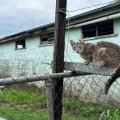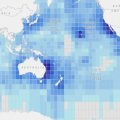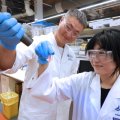A UQ study is seeking at-risk volunteers to help aid early detection and treatment of lung cancer.
Funded by the National Health and Medical Research Council (NHMRC), the study has already detected and treated cancers among 250 screened participants.
“Symptoms can be very vague and often develop in the late stages of the disease which is why lung cancer can be so difficult to detect,” UQ School of Medicine PhD candidate Dr Henry Marshall said.
“We hope to detect the cancer while it is still in the early stages, giving people the best chance of early diagnosis and cure.”
Open to volunteers between 60 and 74 years old, the study is seeking people who have smoked at least 20 cigarettes per day for 30 years or more and are either still smoking or have recently quit.
Volunteers may also have past asbestos exposure, since asbestos is a risk factor for lung cancer.
“Early detection is important and should mean the cancers are smaller and less likely to have spread,” Dr Marshall said.
“They also have the best chance to be cured because they can be surgically removed.”
Using low dose radiation computerised tomography (CT scans), the screening looks for small lung cancers which are not yet causing symptoms and not readily detected by chest X-rays.
The low-dose protocol used reduces radiation exposure compared to conventional CT scans.
“The study is looking for people at the highest risk of lung cancer and will follow participants for up to five years. So far we have been pleased to find that low dose CT scans give very good pictures of the lungs.”
The findings will be compared with American and European research to help understand implications of lung cancer screening for the Australian health system. Each year approximately 9000 Australians are diagnosed with lung cancer and 7500 people die.
Dr Marshall is one of 136 researchers across Australia to be awarded scholarship funding from the NHMRC.
The study is led by Drs Kwun Fong, Rayleen Bowman and Ian Yang, and involves the work of radiologists Drs Richard Slaughter, Melanie Fuentes and Jane Crossin.
It is funded by grants from the National Centre for Asbestos Related Diseases and Queensland Smart State, is part of the Lung Cancer Screening Study at the Prince Charles Hospital Brisbane and The University of Queensland.
If at-risk volunteers do not meet the study entry requirements, Dr Marshall advises smokers to quit and to see their General Practitioner about worrying symptoms such as recurrent chest infections, persistent or worsening cough, chest pain, weight loss, general lethargy or breathlessness.
Anyone interested in taking part may contact the research team on (07) 3139 6194 or lungscreen@health.qld.gov.au for further details. If emailing please include your full name, age, address and phone number.
Additional Information:
The NHMRC is Australia’s peak body for supporting health and medical research. The grants, totaling $9.7 million, are awarded competitively and are regarded as the most prestigious of their type for upcoming researchers.
The Prince Charles Hospital is the home of the Queensland Lung Cancer Database and Australia’s largest lung tissue bank.
Media: Allison Rock at UQ Communications (07 3365 2619, Allison.rock@uqconnect.edu.au)
.jpg)









